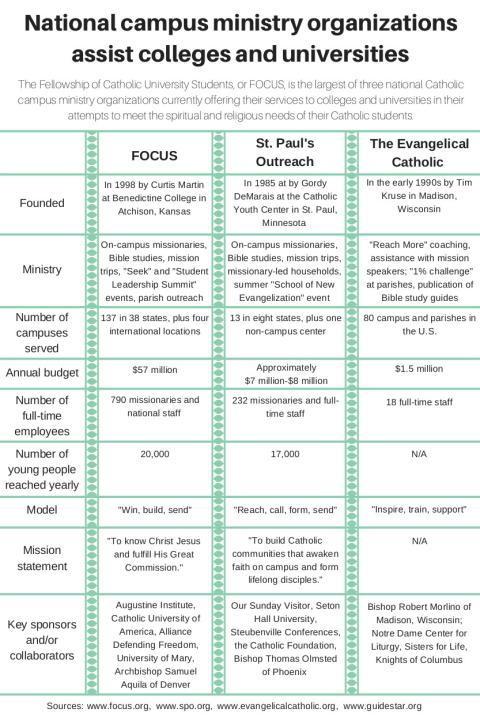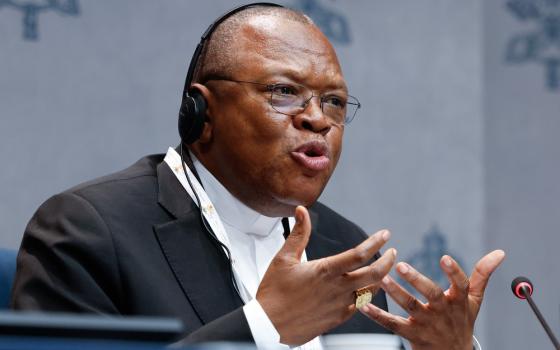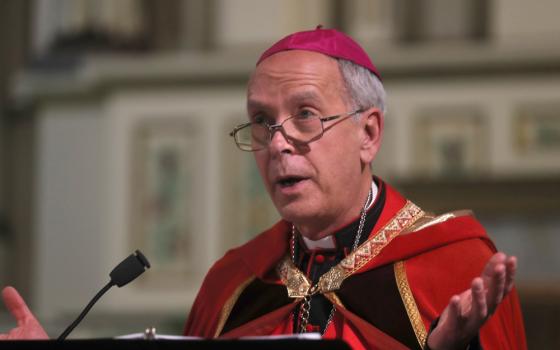
A sign for reserved seating is seen as young people pray during the closing Mass Jan. 6 for the Student Leadership Summit sponsored by the Fellowship of Catholic University Students in Chicago. (CNS/Chicago Catholic/Karen Callaway)
David Hickson is a typical FOCUS employee: fresh-faced, enthusiastic and confident that he is doing God's work. However, unlike many of his colleagues, Hickson did not get introduced to the Fellowship of Catholic University Students as a college student. He started as a donor.
After graduating from Franciscan University of Steubenville, Ohio, Hickson was working as a Spanish teacher in the Washington, D.C., area when two friends from college asked him to support their work as FOCUS missionaries. (One was Gabriel Hahn, son of Catholic convert and apologetics author Scott Hahn.)
Such financial support — which FOCUS calls "ministry partnership" — requires each of its nearly 700 missionaries to raise a substantial portion of their salary: at least $3,260 a month. Patterned after the Protestant evangelical organization Campus Crusade for Christ (now rebranded as "Cru"), ministry partnership is one of FOCUS' main financial models.
Today, Hickson — who is married and has two children — is on the flip side, fundraising his salary through the generosity of about 100 supporters who donate anywhere from $2 to $250 a month for him to work as FOCUS' international missions manager, coordinating service trips like the one where he met his wife, also a former FOCUS campus missionary.
FOCUS' financial model of ministry sponsorship — combined with national fundraising, profits from conferences and mission trips, and fees paid by dioceses or schools — has helped FOCUS achieve extraordinary financial success and facilitated massive growth in its 20-year history. In fact, FOCUS' $57 million budget for the year ending May 31, 2017, is double its operating budget from just five years ago.
Those numbers dwarf comparable organizations, such as Jesuit Volunteer Corps, which raises and spends approximately $5 million a year, one-tenth as much as FOCUS. A competing Catholic campus ministry program, called St. Paul's Outreach, also is much smaller, with an annual budget of approximately $8 million, according to its financial records.
In fact, FOCUS' budget is comparable to the much more prominent EWTN, the conservative Catholic television network, well-known for its influence on the U.S. church — and for its connections to other conservative Catholic groups.
The majority of FOCUS' $57 million — 82 percent — is spent on program services, whether on campuses, at conferences or on mission trips. The organization spends 11 percent on fundraising expenses and 7 percent on administrative expenses, according to its most recent annual report. Those percentages are well within the recommended overhead for Better Business Bureau Wise Giving Alliance's Standards for Charity Accountability, which calls for at least 65 percent of revenue to be spent on programs.
Focused fundraising
Where does FOCUS get its money? More than half comes from "support team contributions" via mission partnerships such as Hickson's, according to the organization's annual reports and tax documents.

Missionaries with FOCUS pray the rosary during a June 13, 2017, procession in Ave Maria, Florida. (CNS/Courtesy of FOCUS)
This fundraise-your-salary model is more common in Protestant evangelical organizations, although St. Paul's Outreach also uses it. Both Catholic organizations promote a "Lord will provide" mentality when it comes to missionaries' fundraising, but the organizations also provide training in how to write request letters and approach prospective donors. The FOCUS website contains a page for each missionary to tell his or her story with a direct link to an individual donation page.
If missionaries fail to hit the minimum requirement, they may be pulled from campus temporarily to fundraise full time; otherwise, fundraising is emphasized during summer and other academic breaks. During the school year, missionaries should expect to dedicate about four hours a week to "donor ministry," which may include giving presentations at parishes, according to a FOCUS handbook.
A missionary's salary varies based on their fundraising success, with a minimum of about $36,000 and a maximum of over $50,000, depending on the missionary's situation. (The maximum for St. Paul's Outreach is lower, according to its website.)
FOCUS' salaries are more in line with Cru's, which also vary based on the employee's need: A starting salary for a single person was $28,000 in 2016, while a married couple with no children would make $55,000, according to its website.
FOCUS' maximum for a new missionary can seem high when compared to a typical entry-level campus minister, and would be closer to the $65,000 average salary of a head of university campus ministries, according to the most recent data from the Professionals in Higher Education Salary Survey.
Studies of personal fundraising in evangelical outreach ministries, primarily by University of Oklahoma sociologist Samuel Perry, have found the model works less well in communities of color, leading to an overrepresentation of white people in those organizations.
For FOCUS, not only missionaries, but also college students are encouraged to fundraise from their family and friends to pay to attend the organization's annual conferences, called "Seek" (focused on faith exploration) and "Student Leadership Summit" (which emphasizes leadership development). This year's five-day, four-night summit in Chicago cost $700 per student (with a $200 discount for those involved in FOCUS on their campuses), plus travel and food.
A "student fundraising packet" provides sample letters, thank-you notes and phone scripts, as well as scriptural references that encourage giving others "the opportunity to support your walk with the Lord!"
Those conferences — which attract thousands of attendees (13,000 to Seek in San Antonio in 2017 and 8,000 to the Student Leadership Summit in Chicago in 2018) — also are a source of income for FOCUS. Together with international mission trips, these events account for 17 percent of income and 11 percent of expenditures, according to annual reports.
A good deal for dioceses?
In addition, campuses that contract with FOCUS missionaries — who are usually in teams of four — pay FOCUS headquarters $15,000 per missionary, or $60,000 per year for four full-time employees, which FOCUS said covers about one quarter of the cost. With 138 campuses, those annual fees amount to about $8 million, or 14 percent of the organization's revenue.
That fee is much less than the cost of hiring four non-FOCUS employees, said Michael St. Pierre, executive director of the Catholic Campus Ministry Association. Consequently, some universities — and bishops — see FOCUS as a relatively inexpensive way to beef up campus ministry staff.
"It was like multiplying my ministry by four or more," said Fr. Michael Schmitz, chaplain at the University of Minnesota Duluth. He is one of only two non-FOCUS, full-time staff members at the Newman Center there. "I have 14,000 students on campus, and there are only 24 hours in the day."

Fr. Peter Mussett, of St. Thomas Aquinas Catholic Center at the University of Colorado Boulder, chats with Fellowship of Catholic University Students missionaries on the campus in 2014. (CNS/Courtesy of FOCUS)
The model works well at Schmitz's university, which has hired FOCUS missionaries for the past 10 years, he said. Sunday Mass attendance at the Newman Center is up 40 percent from last year, he said, and daily Mass attendance has risen 25 to 30 percent, not to mention previous increases as well, which he credits — at least in part — to the missionaries' outreach.
Schmitz thinks the cost of FOCUS is worth it. "We get back far more than we have to give," he said. The Duluth Diocese pays FOCUS' campus fee, but in some dioceses, it comes from the school's campus ministry budget.
But universities that have dropped FOCUS as part of their campus ministry programming question the financial arrangement — as well as the organization's approach and theology.
"I can see the appeal to bishops [who think they] can do something with campus ministry without the costs of a trained campus minister," said Mary Deeley, pastoral associate at Northwestern University in Evanston, Illinois, whose Sheil Catholic Center ended its relationship with FOCUS in 2015.
"But is there bang for your buck?" she asked. Not for Northwestern, Deeley believes.
FOCUS missionaries "are not trained in liturgy and can't do pastoral counseling. They only do Bible study and one-on-one outreach," Deeley said, whereas a full-time campus minister would be more versatile, with training in all those areas.
Fr. Patrick Marshall at the University of Illinois at Chicago also could not justify the expense, given the small numbers of students who participated in FOCUS Bible studies at the campus. He figured that the 50 or so students active in FOCUS were costing campus ministry $1,000 per student per year.
"The numbers just weren't increasing," said Marshall, chaplain at the St. John Paul II Newman Center at the university. The fee for the FOCUS missionaries represented about one-tenth of his overall budget for an estimated 18,000 Catholic students at the school. "It just got to the point where I couldn't justify it."
Conservative connections
In some cases, outside donors have offered to pay a campus' fee. These donors — sometimes anonymous — may be connected to the university or may come from FOCUS' national donor pool, which provides 16 percent of FOCUS' income and includes wealthy Catholics and several big names from conservative Catholic circles.
FOCUS founder Curtis Martin and at least two members of FOCUS' President's Advancement Council are or have been members of Legatus, an organization of wealthy Catholic executives founded by Domino's Pizza magnate Thomas Monaghan. Legatus also has extensive membership overlap with the Napa Institute, which hosts the foremost gathering of well-heeled conservative Catholic financiers at founder Timothy Busch's swanky resort in northern California.
Advertisement
Serving on FOCUS' board of directors is William Mumma, president and chair of the board of the Becket Fund for Religious Liberty, a right-wing legal group trying to redefine religious liberty through cases involving Hobby Lobby, the Little Sisters of the Poor of Denver, and others who have challenged the Obama administration's mandate for contraception coverage in all insurance plans.
FOCUS' national fundraising also brings in grants from foundations, again some with conservative connections, according to data from the Foundation Directory Online. For example, one FOCUS grantor is New York hedge fund honcho Sean Fieler's Chiaroscuro Foundation, which funds a number of anti-gay-marriage groups and other conservative groups. (Fieler also serves on the board of the Becket Fund.)
Larger, more recent grants to FOCUS include $1 million from the Tulsa Community Foundation and more than $500,000 from a Nebraska-based foundation created by trucking businessman C.L. Werner. Werner also help fund — with the Charles Koch Foundation — a controversial institute at Creighton University in Omaha that promotes free-market economic theories. (Charles Koch is the Kansas billionaire who with his brother, David, has become influential in libertarian and conservative politics.)
This Creighton Institute for Economic Inquiry was the brainchild of wealth manager Gail Werner-Robertson, who also serves on FOCUS' board of directors.
FOCUS' board also includes Jonathan Reyes, assistant general secretary for Integral Human Development for the U.S. Conference of Catholic Bishops. Reyes helped found and served as the first president of the Augustine Institute of Denver, a graduate program dedicated to the new evangelization and "faithful orthodoxy" and whose bishops' advisory board includes some of most conservative prelates in the country.
Other donors and board members — and, in some cases, Martin — teach or serve on the boards at the Aquinas Institute or other conservative Catholic schools, such as Franciscan University of Steubenville, Monaghan's Ave Maria University in Florida, and others. FOCUS also just partnered with the University of Mary to offer a Master of Business Administration in Catholic philanthropy through a new institute at the school, which was named the No. 1 most conservative college in North Dakota by a website that ranks conservative schools.
Other FOCUS supporters include board member Alejandro Bermudez, executive director of Catholic News Agency, which is owned by ETWN; advancement council member Frederic Clark, who is also on the board of the Institute on Religion and Public Life, publisher of First Things magazine; and national chaplain Capuchin Fr. John Lager, a co-founder of the evangelically-minded "Marked Men for Christ" retreats.
Other board and council members are affiliated with more progressive or mainstream organizations such as the Cristo Rey Network or the Maryknollers. And the chief financial officer from FOCUS, in turn, serves on the board of the Catholic Campus Ministry Association, a sign of "partnership and collaboration" between the two organizations, said St. Pierre.
But the official sponsors and most of the exhibitors at the Student Leadership Summit in Chicago also represented conservative organizations, including the Augustine Institute, Franciscan University of Steubenville, the Liturgical Institute in Mundelein, Illinois, Relevant Radio and others. These sponsors also are promoted through emails and other communications to conference attendees, donors and others who end up on FOCUS' mailing lists.
In some ways, turning energetic young Catholics into a solid donor base is an impressive feat, said Kevin Ahern, an assistant professor of religious studies at Manhattan College in New York who has researched worldwide student movements.
But FOCUS' corporate model — as opposed to the student-led movements of the past and still present in other parts of the world — has its negatives, too, Ahern said. "FOCUS is not a student organization; it's a student-serving organization," he said. "It has a model of corporate governance, with boards of directors, like many of our Catholic institutions, drawn from people with financial resources, usually older white men."
(Every member of FOCUS' current 21-person advancement group is white. The 18-member board of directors includes one Latino.)

Capuchin Franciscan Fr. John Lager, national chaplain for FOCUS since 2013, holds the monstrance during adoration at the organization's SEEK 2015 gathering in Nashville, Tennessee. (CNS/Courtesy of FOCUS)
Are the students involved in FOCUS aware of the organization's connections to conservative groups? Most of the missionary partners are just helping out a friend who has decided to devote a couple years to being a missionary.
For Hickson, however, being asked by his friends to donate to FOCUS has been life-changing and has literally taken him all over the world as international missions manager. In exchange for his financial support, the missionaries prayed for his intentions and kept him informed about their work, which inspired him to make changes in his own life.
"These missionaries brought me back to the love of the Father ... and called me to holiness," said Hickson, who eventually realized: "I need to live differently."
[Heidi Schlumpf is NCR national correspondent. Her email address is hschlumpf@ncronline.org. Follow her on Twitter @HeidiSchlumpf.]







